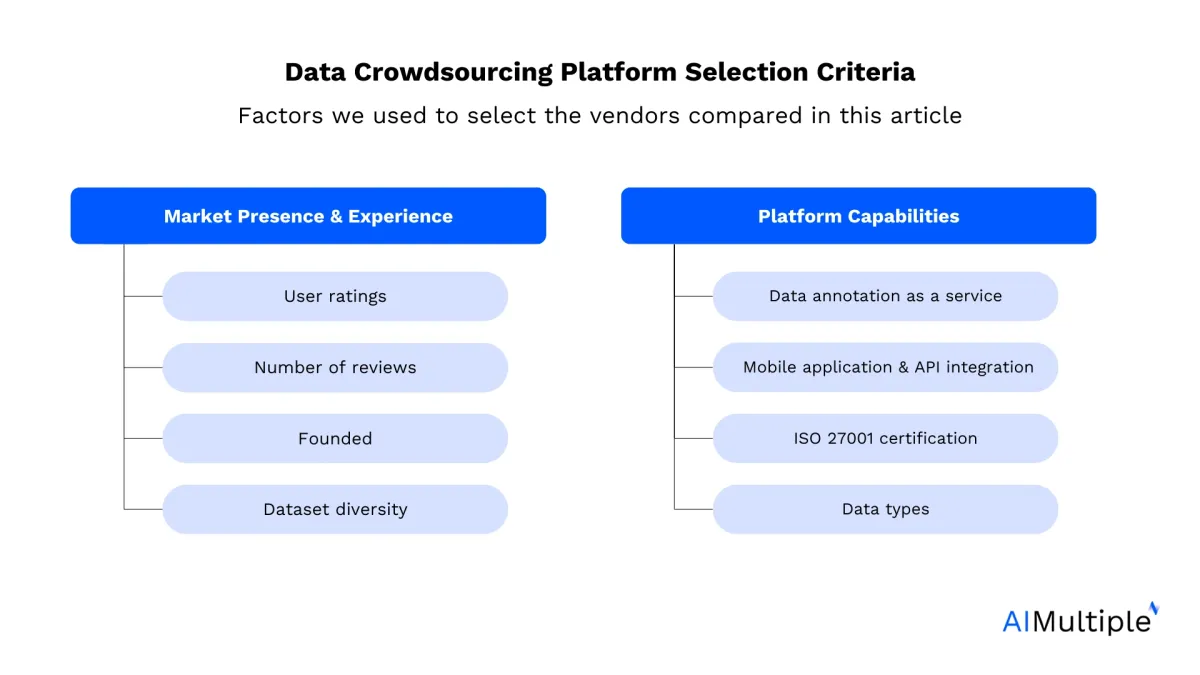With the spread of AI tools like generative AI and chatbots, the demand for AI data services has also increased. One such service is data crowdsourcing platforms, which leverage large groups to gather data, enhancing collection efforts with fast, detailed insights.
See the best crowdsourcing platforms to fulfill your on-demand AI data needs:
Top data crowdsourcing platforms
| Platforms | Data Annotation As A Service | Mobile application | API availability | ISO 27001 Certification | Code of Conduct |
|---|---|---|---|---|---|
| LXT | ✅ | ✅ | ✅ | ✅ | ✅ |
| Appen | ✅ | ✅ | ✅ | ✅ | ✅ |
| Prolific | ✖ | ✖ | ✅ | ✖ | ✅ |
| Amazon Mechanical Turk | ✅ | ✖ | ✅ | ✅ | ✖ |
| Telus International | ✅ | ✖ | ✅ | ✖ | ✖ |
| TaskUs | ✅ | ✖ | ✅ | ✅ | ✅ |
| Summa Linguae Technologies | ✅ | ✅ | ✅ | ✅ | ✖ |
| Surge AI | ✅ | ✖ | ✅ | ✅ | ✖ |
| Toloka AI | ✅ | ✅ | ✅ | ✅ | ✅ |
| Innodata Inc | ✅ | ✖ | ✅ | ✅ | ✖ |
- The companies are sorted by the number of reviews in both tables, with the sponsored ones listed at the top.
- The comparison table is created from publicly available and verifiable data.
- The companies selected in this comparison were based on the relevance of their services. This means whether they offer data collection or generation services through a crowdsourcing platform.
- All vendors chosen for this comparison have 50 or more employees.
- Apart from Surge AI, which only offers speech and text data, all companies cover a wide range of data types, including image, video, audio, and text.
- A company is assumed to follow a code of conduct if it has a code of conduct page on its website.
Comparison based on vendor market presence & experience criteria
| Platforms | User Ratings Out of 5 (Avg)* | Number of Reviews* | Founded in | Data Collection Focus** |
|---|---|---|---|---|
| LXT*** | 4.1 | 68 | 2010 | ✅ |
| Appen | 4.2 | 54 | 1996 | ✅ |
| Prolific | 4.7 | 48 | 2014 | ✅ |
| Amazon Mechanical Turk | 4 | 28 | 2005 | ✅ |
| Telus International | 4.3 | 10 | 2005 | ✖ |
| TaskUs | 4.3 | 6 | 2008 | ✖ |
| Summa Linguae Technologies | N/A | N/A | 2011 | ✅ |
| Surge AI | N/A | N/A | N/A | ✖ |
| Toloka AI | N/A | N/A | 2014 | ✅ |
| Innodata Inc | N/A | N/A | 1988 | ✅ |
* Based on data from leading B2B review platforms.
** A company was considered to be data collection-focused if data collection was seen as the main offering on its website.
***Since LXT acquired Clickworker, their reviews were combined when calculating LXT’s scores.
Here is the criteria we used for the comparison.
Data crowdsourcing platforms’ overview
1. LXT
LXT is a data crowdsourcing platform that breaks down large projects into microtasks and distributes them to a global network for completion. It specializes in tasks such as AI data collection, data annotation, data categorization, and web research. Here is a list of LXT’s data solutions:
- AI training data collection or generation
- Image & video datasets
- Audio or speech datasets
- Text datasets
- Data annotation service
- Research/survey data collection
- Reinforcement learning from human feedback (RLHF)
Pros and cons:
- The company is suitable for projects of all scales, from small to large.
- Its network of contributors is the largest among its competitors and is reportedly reliable according to previous customers.
- Its data annotation service is considered adequate and scalable by previous customers.
2. Appen
Appen also offers data services through a crowdsourcing platform. It provides services that include:
- Data collection
- Data annotation
- Data validation
Pros and cons:
- Appen’s platform is considered user-friendly, and its data processing services are reportedly effective.
- According to recent news, Appen’s performance has been declining as it loses clients and goes through financial losses.1
- Some customers highlighted server crashes on Appen’s platform.
- Appen is suitable for small to mid-sized projects due to its smaller participant network.
Learn about Appen alternatives here.
3. Prolific
Prolific is another crowdsourcing platform that offers data services for various use cases. Organizations use it for AI data, academic research, and market research purposes. Learn about prolific alternatives here.
Here is a list of their offerings:
- AI data collection
- AI training and evaluation
- Academic research data
- Online survey participants
Pros and cons:
- Prolific does not offer data annotation as a service; instead, it offers the option to pair your annotation tools.
- Some of Prolific’s workers were using AI tools to complete their tasks, based on previous customer reviews.
- Its research data collection service is more popular than its AI data services.
4. Amazon Mechanical Turk (MTurk)
Amazon Mechanical Turk, also known as MTurk, is a crowdsourcing platform, and here is a list of its offerings:
- Data collection
- Data annotation
- Market research & surveys
- Academic research
- Other data services
Pros and cons:
- Its data collection service is considered to be quick, efficient, and user-friendly.
- The quality of its data projects is reportedly low according to customers.
- It has a significantly smaller network of contributors, and most of the contributors lack English skills.
Learn about Amazon Mechanical Turk alternatives here.
5. Telus International
Telus International focuses on customer experience (CX) and digital IT solutions. While it offers a wide range of services, it also provides data services through a crowdsourcing platform.
Pros and cons:
- It offers data annotation along with its AI data collection services
- AI data-related is not the primary focus of Telus International. It mainly focuses on the customer experience domain.
- Some customers found Telus International’s data annotation service slow.
6. TaskUs
While TaskUS’s key offerings revolve around customer experience, it also offers the following AI services:
- Data collection
- Data annotation (image, video, audio, and text)
- Data for research
Pros and cons:
- The company offers data collection and annotation services for almost all data types.
- The crowd size is significantly smaller than that of other crowdsourcing platforms, such as Clickworker and Appen.
- The company’s main focus is not on collecting and annotating AI data.
7. Summa Linguae Technologies
Summa Linguae Technologies also operates through a crowdsourcing platform. Its offerings include:
- Data collection for AI models
- Data annotation
- Data translation
8. Surge AI
Based in California, Surge AI provides training data for machine learning models through a crowdsourcing platform. Surge AI focuses on collecting and labeling data for Large language models (LLMS)
- AI data labeling and annotation
- AI data collection
- And other human-generated data services
9. Toloka AI
Toloka AI is a crowdsourcing platform for collecting and improving AI training data. They provide various services such as data labeling, data cleaning, and data categorization to enhance machine learning models.
Pros and cons:
- The company offers data collection and annotation of all data types, including images, videos, text, and audio.
- Toloka AI has a significantly smaller crowdsourcing platform with a network of around 200K, which is relatively smaller than its competitors.
10. Innodata Inc.
Based in New Jersey, Innodata Inc. offers various AI solutions through its crowdsourcing platform. Its solutions include data collection and annotation.
Pros and cons:
- The company offers a significantly smaller crowdsourcing platform as compared to its competitors. With a crowd size of only ~5000 workers.
- The company lacks a strong online presence, as we did not find any customer or worker reviews on B2B or B2C platforms.
Comparison criteria for the data crowdsourcing platform

Choosing the right crowdsourcing platform for your AI projects is crucial for ensuring data quality and integrity. We divided the criteria into two categories: market presence and experience & platform capabilities. Here are the key criteria to consider:
Market presence & experience:
- User ratings: This criterion ensures the importance of B2B platform reviews (e.g., G2, TrustRadius, Capterra) in assessing the performance of the data crowdsourcing platform.
- Number of reviews: High review counts indicate a large customer base and offer insights into customer satisfaction levels.
- Founded: Older companies typically have more experience and may provide more refined services. It is therefore essential to consider the company’s age. However, this is not always the case, as some companies focus on a particular service, such as data collection, and gain more expertise in that domain in a shorter period.
- Dataset diversity: This criterion ensures the importance of having a diverse crowd in gathering or generating data to ensure accuracy across various languages and dialects. You can see a comparison of crowd sizes for all companies in Figure 1.
Platform capabilities:
- Data annotation services: This criterion covers the necessity of data annotation for machine learning models and the benefits of integrated annotation services.
- Mobile & API integration: This criterion is for the significance of mobile app availability and API integration in data crowdsourcing platforms.
- ISO 27001 certification: This criterion ensures the importance of data protection practices as indicated by the ISO 27001 certification.
- Code of conduct: This criterion assesses the impact of the platform provider’s ethical practices on a business’s reputation.
- Data types covered: The range of data types a platform offers is crucial for specific applications, such as automated driving systems.
FAQs
What are Crowdsourcing Platforms?
Crowdsourcing platforms are online platforms where businesses can outsource tasks to a large group of people, collectively referred to as the crowd. These platforms provide human-generated data on demand, helping to solve complex problems where traditional methods may fall short. They are instrumental in collecting crowdsourced data, covering a range of tasks, from simple surveys to more complex human intelligence tasks.
What is their role in data collection?
In a world that is increasingly leaning towards AI and machine learning models, a data crowdsourcing platform plays a crucial role. These platforms aid in collecting data for building high-quality datasets, which are essential for training robust AI and machine learning algorithms. The data collected is diverse, ensuring that the AI models trained are robust and well-tested.
What are crowdsourcing use cases in AI?
AI systems require these components in order to function effectively:
Labeled clean data to help the system work accurately
Data science efforts to build effective models
Testing to check if the system works as intended
What are the benefits of a crowdsourced workforce compared to an in-house one?
Diversity: Crowdsourcing enables businesses to gather individuals from different backgrounds, which eventually helps reduce bias in AI solutions.
Faster time-to-market: Businesses can scale a workforce from 0 to the number they need.
Cost-efficient and quality work: Businesses pay based on the work done by individuals rather than agreeing on a contract with fixed terms.


Comments
Your email address will not be published. All fields are required.